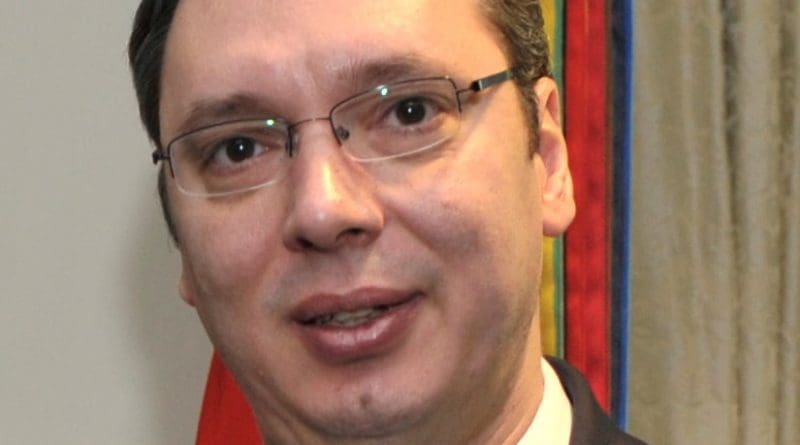Serbia: PM Vucic Orders News Blackout On Arms Finds
By Milivoje Pantovic
Serbian Prime Minister Aleksandar Vucic has ordered members of security and state institutions in charge of his safety from going public with any more information on the weapons caches reportedly found in and around Belgrade, Serbian national broadcaster RTS reported on Wednesday.
According to the same report, Vucic did not show up in his office on Wednesday, for the first time since he took office in 2014. His staff did not give a reason for his absence.
Following Vucic’s order, the session of parliament’s Board for the Control of Security Services, which was due to discuss the Prime Minister’s safety on Thursday, has been cancelled.
The order came after police on Tuesday said they had found a new arms stash in a car in a garage in New Belgrade containing 400 grammes of explosives, a detonator, two mobile phones for remote activation of the explosives, a gun and a submachine gun.
Concerns have been raised that the weapons were intended for use against Vucic or his brother, after Interior Minster Nebojsa Stefanovic on Tuesday said the Prime Minister had voiced concerns about the safety of his brother, Andrej Vucic.
On Sunday, at a press conference, Vucic accused the media of “targeting” his brother, an owner of restaurants and a businessman.
Interior Minister Stefanovic said last Saturday that Prime Minister Vucic had been “moved to safety” after police found a large quantities of weapons hidden close to his family home in Jajinci, near Belgrade.
Stefanovic stated on that occasion that police found several hand grenades, a bazooka and large quantities of ammunition for machine-guns and snipers, hidden in the woods.
Miroslav Hadzic, from the Belgrade Centre for Security Policies, a think tank, stated on Wednesday that “this kind of public investigation”, meaning regular public updates on the findings in Jajinci and New Belgrade, was not normal practice in security circles.
“If we bear in mind that in recent months we have repeatedly frightened citizens and the public, saying something will happen, it all creates a suspicion that someone is intentionally producting such situations,” Hadzic told Belgrade-based TV N1.
He said the public was being subjected to a staged dramatisation of events, and that a politicisation of these events would likely follow.
“The perpetrators of [events in] Jajinci are not even identified yet but now they are putting the PM’s brother into the equation. That is another mistake by the police minister, to publicly talk about the weak points of the PM and his brother. That should remain a secret,” he said.
Security experts and analysts say the investigation into a suspected planned attack on Vucic should be conducted promptly and discretely.
Journalist Filip Svarm told BIRN that since Serbia has has direct experiences of political assassinations, noting the killing of late Prime Minister Zoran Djindjic in 2003 , all such threats should be investigated and taken seriously.
“What worries me is that we hear a lot about investigations without real information, so it is looking more like political PR stunt then some serious investigation,” he said.
A former director of the Military Security Agency, Svetko Kovac, said on Wednesday that it was not clear that the arms found in Jajinci were intended for use against Vucic.
“All necessary measures should be undertaken so that it is revealed for what purpose the arms were left in Jajinci, who put them there and for what reason,” Kovac said in a statement on Wednesday to the Serbian daily Politika.
– See more at: http://www.balkaninsight.com/en/article/serbian-pm-orders-silence-on-guns-investigation-11-02-2016#sthash.Tuo8V2Ve.dpuf

